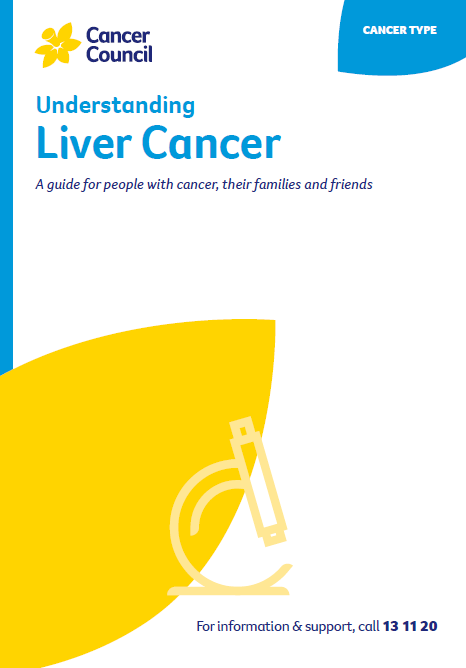- Home
- Liver cancer
- Diagnosis
- Staging and prognosis
Liver cancer staging and prognosis
The stage of a cancer describes how large it is, where it is and whether it has spread in the body. Knowing the stage of a liver cancer helps doctors plan the best treatment for you.
Learn more about:
Staging primary liver cancer
Primary liver cancer is staged using a method called the Barcelona Clinic Liver Cancer (BCLC) staging system. The system has 5 stages:
- 0 (very early)
- A (early)
- B (intermediate)
- C (advanced)
- D (end-stage).
To work out a cancer’s stage, your doctor will consider:
- the size of the tumour
- the number of tumours
- whether the cancer has spread to blood vessels, lymph nodes or other organs
- how well you are functioning in daily life and how active you are
- how well the liver is working (using a Child-Pugh score).
The Child-Pugh score records how well the liver is working. In this system, liver function is ranked as:
- A (some damage but is working normally)
- B (moderate damage, affecting how well the liver is working)
- C (very damaged and not working well).
A severely damaged liver may not be able to cope with some types of cancer treatment.
The doctor may also check for portal hypertension. Cirrhosis can sometimes increase the blood pressure in the portal vein, which carries blood from the digestive organs to the liver. This can affect how the cancer can be treated (e.g. surgery may not be an option in people with portal hypertension).
Prognosis
Prognosis means the expected outcome of a disease. You may wish to discuss your prognosis with your doctor, but it is not possible for anyone to predict the exact course of a disease.
To work out your prognosis, your doctor will consider:
- test results
- the type of liver cancer, its stage and how fast it is growing
- whether you have cirrhosis and how well the liver is working
- how well you respond to treatment
- other factors such as your age, fitness and overall health.
Discussing your prognosis and thinking about the future can be challenging and stressful. It is important to know that although the statistics for primary liver cancer can be frightening, they are based on an average of many cases and may not apply to your situation. Talk to your doctor about how to interpret any statistics that you come across.
The prognosis for liver cancer tends to be better when the cancer is still in the early stages, but liver cancer is often found later. Surgery to remove the cancer (liver resection) or a liver transplant may be an option for some people with primary liver cancer. Other treatments for liver cancer can significantly improve survival and can relieve symptoms to improve quality of life.
It helps to focus on what is happening now, what is actually known – not all the possibilities. One step at a time.
Sam
→ READ MORE: Liver cancer health care team
Podcast: Tests and Cancer
Listen to more episodes of our podcast for people affected by cancer
More resources
A/Prof Simone Strasser, Hepatologist, AW Morrow Gastroenterology and Liver Centre, Royal Prince Alfred Hospital and The University of Sydney, NSW; A/Prof Siddhartha Baxi, Radiation Oncologist and Medical Director, GenesisCare, Gold Coast, QLD; Prof Katherine Clark, Clinical Director of Palliative Care, NSLHD Supportive and Palliative Care Network, Northern Sydney Cancer Centre, Royal North Shore Hospital, NSW; Anne Dowling, Hepatoma Clinical Nurse Consultant and Liver Transplant Coordinator, Austin Health, VIC; A/Prof Koroush Haghighi, Liver, Pancreas and Upper Gastrointestinal Surgeon, Prince of Wales and St Vincent’s Hospitals, NSW; Karen Hall, 131120 Consultant, Cancer Council SA; Dr Brett Knowles, Hepato-Pancreato-Biliary and General Surgeon, Royal Melbourne Hospital, Peter MacCallum Cancer Centre and St Vincent’s Hospital, VIC; Lina Sharma, Consumer; David Thomas, Consumer; Clinical A/Prof Michael Wallace, Department of Hepatology and Western Australian Liver Transplant Service, Sir Charles Gairdner Hospital Medical School, The University of Western Australia, WA; Prof Desmond Yip, Clinical Director, Department of Medical Oncology, The Canberra Hospital, ACT.
View the Cancer Council NSW editorial policy.
View all publications or call 13 11 20 for free printed copies.
Need to talk?
Support services
Coping with cancer?
Speak to a health professional or to someone who has been there, or find a support group or forum
Work and cancer
Information for employees, employers and workplaces dealing with cancer
Cancer information
Your coping toolbox
Ways to cope with the challenges caused by cancer
View our publications
Guides and fact sheets for people with cancer, their families and friends

